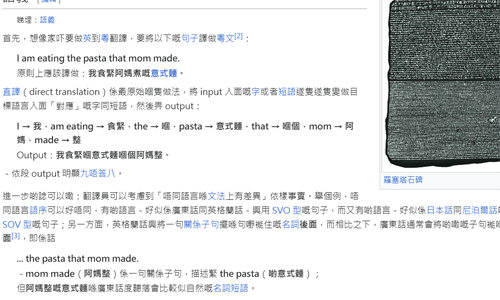Services de traduction en cantonais
Jinyu Translation propose fièrement des services complets de traduction en cantonais pour faciliter une communication efficace et une interaction fluide avec les publics parlant le cantonais. Le cantonais, un dialecte chinois largement parlé principalement dans le sud de la Chine, à Hong Kong et à Macao, présente des nuances linguistiques et des considérations culturelles uniques qui nécessitent une expertise spécialisée pour une traduction précise. Notre équipe dévouée de traducteurs natifs de langue cantonaise possède les compétences linguistiques et la compréhension culturelle nécessaires pour fournir des traductions de haute qualité adaptées à divers secteurs et besoins de communication. Que vous ayez besoin de services de traduction, d'interprétation, de localisation ou de transcription de documents, Jinyu s'engage à fournir des solutions précises et culturellement pertinentes pour vous aider à surmonter les barrières linguistiques et à atteindre vos objectifs de communication dans le monde parlant le cantonais.

Pourquoi nous choisir
Plus
Nos services de traduction en cantonais bénéficient grandement de notre équipe de traducteurs natifs cantonais qui possèdent une connaissance approfondie des nuances de la langue, des expressions familières et du contexte culturel. En tant que locuteurs locaux, ils comprennent les subtilités de la communication cantonaise, garantissant des traductions précises et culturellement appropriées qui trouvent un écho auprès du public cible.
Forte de plusieurs années d'expérience dans la traduction en cantonais, notre équipe native apporte une grande expertise à chaque projet. Elle a perfectionné ses compétences en relevant divers défis linguistiques et a développé une compréhension approfondie de la grammaire, du vocabulaire et des expressions idiomatiques cantonais, ce qui lui permet de fournir des traductions d'une qualité et d'une précision exceptionnelles.
Grâce à notre équipe native de langue cantonaise, nous pouvons proposer des tarifs compétitifs et économiques pour nos services de traduction. En éliminant le besoin d'intermédiaires ou de niveaux de traduction supplémentaires, nous simplifions le processus et répercutons les économies de coûts sur nos clients sans compromettre la qualité des traductions. Cela garantit aux entreprises un accès à des services de traduction professionnels en cantonais à des tarifs abordables, rendant ainsi la communication efficace dans le monde cantonais accessible à tous.
Plus
Chez Jinyu Translation, nous accordons la priorité à la qualité de nos services de traduction en cantonais en employant des traducteurs humains qui sont des locuteurs natifs du cantonais. Contrairement à la traduction automatique, les traducteurs humains possèdent l'intuition linguistique et la sensibilité culturelle nécessaires pour transmettre avec précision le sens et le contexte en cantonais. En tirant parti de l'expertise de nos traducteurs qualifiés, nous garantissons que chaque traduction est méticuleusement élaborée pour maintenir l'intégrité du contenu d'origine tout en trouvant un écho auprès des publics parlant le cantonais.
Nos services de traduction en cantonais bénéficient d'une base de données terminologique complète, organisée par notre équipe d'experts linguistiques. Cette base de données contient du vocabulaire spécialisé, des termes spécifiques à un secteur d'activité et des expressions idiomatiques cantonaises pertinentes pour divers domaines, garantissant ainsi la cohérence et l'exactitude des traductions. En accédant à cette vaste ressource, nos traducteurs peuvent naviguer efficacement dans une terminologie complexe et produire des traductions qui répondent aux normes les plus élevées de précision linguistique et d'expertise dans un domaine spécifique.
Nous suivons un processus de travail scientifique et des processus d'assurance qualité rigoureux pour garantir les normes de qualité les plus élevées dans nos services de traduction en cantonais. Notre flux de travail comprend plusieurs étapes, notamment la traduction, l'édition, la relecture et les contrôles de qualité, effectués par des linguistes expérimentés et des experts en la matière. Grâce à des processus de révision et de validation systématiques, nous vérifions l'exactitude, la cohérence et l'intégrité linguistique de chaque traduction, garantissant ainsi que les livrables finaux répondent ou dépassent les attentes de nos clients. Cette approche méticuleuse de l'assurance qualité souligne notre engagement à fournir des traductions en cantonais fiables et professionnelles pour divers besoins commerciaux.
Plus
Jinyu Translation propose des options de livraison internationales pratiques pour nos services de traduction en cantonais, garantissant accessibilité et flexibilité pour les clients du monde entier. Que vous soyez situé à Hong Kong, en Chine continentale ou ailleurs dans le monde, notre plateforme en ligne transparente vous permet de soumettre des demandes de traduction et de recevoir des livrables en toute simplicité. Grâce à des méthodes de livraison rapides et efficaces, notamment la transmission électronique et les services postaux, nous accordons la priorité à la commodité et à l'accès rapide à des traductions en cantonais de haute qualité, quelles que soient les frontières géographiques.
Nos services de traduction en cantonais s'appuient sur un service client réactif et attentif, qui s'efforce de répondre rapidement à vos demandes, préoccupations et exigences de projet. Notre équipe de spécialistes linguistiques est à votre disposition pour vous aider tout au long du processus de traduction, en vous offrant des conseils personnalisés, une communication claire et un soutien proactif. De la consultation initiale à l'assistance après livraison, nous accordons la priorité à la satisfaction du client et nous efforçons de dépasser vos attentes en offrant un service exceptionnel à chaque étape de votre engagement avec nous.
Jinyu Translation dispose d'un réseau de traducteurs et d'interprètes experts qui maîtrisent le cantonais et possèdent une expertise spécialisée dans divers secteurs et domaines. Que vous ayez besoin de services de traduction de documents, d'interprétation simultanée ou d'interprétation consécutive, nos linguistes qualifiés sont équipés pour répondre à vos besoins avec professionnalisme et précision. En vous mettant en relation avec des traducteurs et des interprètes qualifiés qui comprennent les nuances de la communication en cantonais, nous garantissons que vos exigences linguistiques sont satisfaites avec précision et fiabilité, améliorant ainsi la commodité et l'efficacité de nos services de traduction.
Informations sur les services de traduction en cantonais
1. Différence entre le cantonais et le mandarin
Le cantonais et le mandarin sont deux dialectes distincts de la langue chinoise, chacun avec ses propres caractéristiques uniques et ses variations régionales. Voici quelques différences clés entre le cantonais et le mandarin :
Système tonal :
- Cantonais : Le cantonais est une langue tonale composée de neuf tons distincts, dont les tons aigus, aigus, moyens, graves, bas, bas, descendants, ascendants moyens, aigus et descendants. Les variations tonales jouent un rôle crucial dans la prononciation et la différenciation des mots en cantonais.
- Mandarin : Le mandarin utilise également des tons, mais son système tonal est plus simple que celui du cantonais. Le mandarin standard comporte quatre tons : aigu, ascendant, descendant-ascendant et descendant.
Phonétique et prononciation :
- Cantonais : Le cantonais possède un système phonétique plus complexe que le mandarin, avec une gamme plus large de consonnes et de voyelles. Il se caractérise également par l'utilisation de consonnes finales, qui sont absentes en mandarin.
- Mandarin : Le mandarin possède un système phonétique plus simple, caractérisé par un nombre limité de consonnes et de voyelles. La prononciation tend à être plus uniforme selon les régions par rapport au cantonais.
plus
Vocabulaire et expressions :
- Cantonais : Le vocabulaire et les expressions cantonais peuvent différer considérablement du mandarin, avec des phrases idiomatiques, de l'argot et des expressions familières uniques propres aux régions cantonaises du sud de la Chine, de Hong Kong et de Macao.
- Mandarin : Le mandarin est le dialecte standard du chinois et est largement utilisé à des fins officielles, dans l'éducation et la communication en Chine et dans d'autres communautés sinophones du monde entier. Son vocabulaire et ses expressions sont standardisés et communément compris par les locuteurs chinois de différentes régions.
Répartition géographique :
- Cantonais : le cantonais est principalement parlé dans les régions du sud de la Chine, notamment dans la province du Guangdong, à Hong Kong et à Macao. Il est également parlé par les communautés chinoises d'outre-mer dans des pays comme les États-Unis, le Canada, l'Australie et le Royaume-Uni.
- Mandarin : Le mandarin est la langue officielle de la Chine et est parlée par la majorité de la population. Il est également largement utilisé à Taïwan, à Singapour, en Malaisie et dans d'autres communautés sinophones du monde entier.
Importance culturelle :
- Cantonais : Le cantonais est profondément enraciné dans l’héritage culturel du sud de la Chine, de Hong Kong et de Macao, et joue un rôle important dans la cuisine, les arts et les divertissements régionaux.
- Mandarin : Le mandarin est une langue unificatrice pour les différents groupes ethniques de la Chine et est essentiel à la cohésion nationale, à l'éducation et à la communication à plus grande échelle. C'est également la langue de la littérature traditionnelle chinoise, de la poésie et des textes classiques.


2. Type de nos services de traduction en cantonais
Chez Jinyu Translation, nous proposons une gamme complète de services de traduction en cantonais pour répondre à divers besoins linguistiques et objectifs de communication. Nos services de traduction en cantonais comprennent :
- Traduction de documents:Nous fournissons une traduction précise et culturellement appropriée de divers types de documents, y compris des contrats juridiques, des rapports commerciaux, des supports marketing, des documents universitaires et des documents personnels tels que des certificats de naissance et des certificats de mariage.
- Services d'interprétation:Nos interprètes qualifiés facilitent la communication transparente entre le cantonais et d’autres langues grâce à l’interprétation consécutive, à l’interprétation simultanée et à l’interprétation de liaison pour les réunions, les conférences, les procédures judiciaires et les négociations commerciales.
- Localisation de sites Web:Nous localisons les sites Web pour cibler efficacement les publics parlant cantonais en adaptant le contenu, les graphiques et les interfaces utilisateur pour refléter les préférences linguistiques et culturelles, garantissant une expérience en ligne attrayante et conviviale.
- Localisation de logiciels:Nos experts localisent les applications logicielles, les applications mobiles et les interfaces logicielles pour répondre aux besoins des utilisateurs parlant cantonais, garantissant l'exactitude linguistique, la fonctionnalité et la convivialité sur le marché cible.
plus
- Transcription vidéo et audio:Nous transcrivons avec précision les enregistrements audio et vidéo en texte cantonais, en fournissant des sous-titres, des légendes ou des transcriptions pour des vidéos, des interviews, des podcasts, des webinaires et d'autres contenus multimédias.
- Publication assistée par ordinateur:Nos services de PAO garantissent que les documents traduits conservent l’intégrité de la mise en page et l’attrait visuel, en incorporant le texte traduit dans des brochures, des dépliants, des manuels et d’autres documents imprimés tout en préservant les éléments de conception.
- Traduction certifiée:Nous proposons des traductions certifiées de documents officiels, tels que des contrats juridiques, des documents d'immigration, des relevés de notes universitaires et des dossiers médicaux, en fournissant des traductions notariées ou assermentées selon les besoins à des fins juridiques ou officielles.
- Traduction spécialisée:Notre équipe comprend des experts en la matière compétents dans divers secteurs, ce qui nous permet de fournir des traductions cantonaises spécialisées dans des domaines tels que le droit, la médecine, la technique, la finance, le marketing, etc.
- Assurance qualité:Nous utilisons des processus rigoureux d’assurance qualité, y compris la révision, l’édition et la relecture des traductions par des linguistes expérimentés, pour garantir l’exactitude, la cohérence et la qualité des traductions en cantonais dans tous les projets.
3. Processus de traduction en cantonais
Chez Jinyu Translation, nos processus de traduction en cantonais sont soigneusement conçus pour fournir à nos clients des traductions précises, culturellement adaptées et de haute qualité. Notre flux de travail simplifié comprend plusieurs étapes clés :
- Consultation initiale:Nous commençons par effectuer une consultation initiale avec le client pour comprendre ses besoins spécifiques, y compris la nature du projet, le public cible, le ton et le style souhaités et toute considération culturelle.
- Attribution des tâches:En fonction des exigences du projet, nous confions la tâche à un traducteur cantonais qualifié et expert dans le domaine concerné. Notre équipe comprend des locuteurs natifs cantonais qui possèdent des compétences linguistiques et des connaissances culturelles.
- Phase de traduction:Le traducteur désigné commence le processus de traduction en traduisant soigneusement le contenu source en cantonais tout en préservant l'exactitude, la clarté et la pertinence culturelle. Il accorde une attention particulière au contexte, au ton et aux nuances pour garantir l'intégrité du message.
- Édition et relecture:Une fois la traduction initiale terminée, le contenu traduit est soumis à une révision et une relecture approfondies par un deuxième linguiste maîtrisant le cantonais. Cette étape garantit l'exactitude linguistique, la cohérence et le respect des exigences du client.
plus
- Assurance qualité:Notre équipe d'assurance qualité procède à une dernière vérification du contenu traduit afin de vérifier l'exactitude, la cohérence et la qualité globale. Elle vérifie également les éventuelles erreurs, incohérences ou nuances culturelles qui pourraient nécessiter des ajustements.
- Avis et commentaires des clients:Nous fournissons le contenu traduit au client pour révision et commentaires. Toutes les révisions ou modifications demandées par le client sont traitées rapidement afin de garantir une entière satisfaction quant aux livrables finaux.
- Finalisation et livraison:Après approbation du client, nous finalisons le contenu traduit et le préparons pour la livraison. Nous veillons à ce que les documents traduits soient livrés dans le format spécifié et dans les délais convenus.
- Assistance post-traduction:Notre engagement envers la satisfaction du client s'étend au-delà de la fin du projet. Nous proposons une assistance post-traduction pour répondre à toutes les questions, préoccupations ou exigences supplémentaires qui peuvent survenir après la livraison.
En suivant ces processus systématiques, nous garantissons que nos services de traduction en cantonais répondent aux normes les plus élevées de qualité, de précision et de professionnalisme, permettant à nos clients de communiquer efficacement avec les publics parlant cantonais.


4. Plans tarifaires de traduction en cantonais
Nos plans tarifaires sont conçus pour répondre aux différentes exigences des projets, garantissant un prix abordable sans compromettre la qualité. Nos plans tarifaires de traduction en cantonais sont basés sur les facteurs suivants :
- Complexité et longueur du document:La complexité et la longueur du document influencent considérablement le prix. Les documents plus longs et plus complexes peuvent nécessiter du temps et des compétences supplémentaires pour être traduits avec précision, ce qui a un impact sur le coût global.
- Expertise en la matière:Les contenus spécialisés, tels que les documents juridiques, les manuels techniques ou les rapports médicaux, peuvent nécessiter une expertise et des connaissances spécialisées. Les prix peuvent varier en fonction du niveau d'expertise nécessaire pour une traduction précise dans des domaines spécifiques.
- Urgence et délai d'exécution:Les projets urgents avec des délais serrés peuvent entraîner des frais supplémentaires en raison de la nécessité de services accélérés. Nous proposons des délais d'exécution flexibles pour répondre aux demandes urgentes, avec des prix ajustés en conséquence.
- Mise en forme et PAO:Les documents nécessitant des services de PAO, tels que les brochures, les dépliants ou les présentations, peuvent impliquer des coûts supplémentaires pour les ajustements de formatage et de mise en page afin de garantir que le contenu traduit conserve son intégrité visuelle.
plus
- Certification et notarisation:Pour les documents officiels nécessitant une certification ou une notarisation, tels que les contrats juridiques ou les documents d'immigration, des frais supplémentaires peuvent s'appliquer pour couvrir le processus de certification et les procédures administratives.
- Rabais sur volume et contrats à long terme:Nous proposons des remises sur volume pour les grands projets ou les contrats à long terme, permettant ainsi aux clients ayant des besoins de traduction continus ou des traductions de documents en masse de réaliser des économies.
- Exigences spécifiques au client:Nous prenons en compte les exigences ou préférences spécifiques du client lors de la détermination des prix, garantissant ainsi la transparence et la flexibilité nécessaires pour répondre aux besoins individuels du projet.
Pour un devis détaillé adapté aux exigences spécifiques de votre projet, veuillez nous contacter pour une consultation.
5. Compétences en traduction en cantonais
La traduction en cantonais requiert un ensemble de compétences linguistiques particulières en raison de la complexité et des caractéristiques distinctes du dialecte. Voici quelques compétences essentielles pour la traduction en cantonais :
- Maîtrise du cantonais:Un traducteur cantonais compétent doit maîtriser le dialecte et posséder une compréhension approfondie de sa phonétique, de ses tons, de sa grammaire et de son vocabulaire. La fluidité permet une compréhension et une expression précises des nuances et des expressions idiomatiques de la langue cantonaise.
- Solides connaissances culturelles:La compétence culturelle est essentielle pour la traduction en cantonais, car elle permet de garantir une communication précise et culturellement appropriée. Les traducteurs doivent comprendre les nuances culturelles, les coutumes, les traditions et le contexte social cantonais pour transmettre des messages efficacement et trouver un écho auprès des publics parlant cantonais.
- Excellente maîtrise de l'anglais:Les traducteurs cantonais travaillent souvent avec des sources anglaises. Une bonne maîtrise de l'anglais est donc essentielle pour comprendre et traduire avec précision le contenu de l'anglais vers le cantonais. Cela comprend la maîtrise de la grammaire, de la syntaxe, du vocabulaire et des expressions idiomatiques en anglais.
- Sensibilité tonale:Le cantonais est une langue tonale composée de neuf tons distincts, chacun ayant une signification différente. Les traducteurs doivent avoir une oreille attentive pour les tons et être capables de les reproduire avec précision dans leurs traductions pour transmettre efficacement le message voulu.
plus
- Attention aux détails:La traduction en cantonais exige une attention méticuleuse aux détails pour garantir l'exactitude et la précision dans la transmission du sens voulu du texte source. Les traducteurs doivent prêter une attention particulière à la grammaire, à la syntaxe, à la ponctuation et au contexte pour produire des traductions de haute qualité.
- Compétences en recherche:Les traducteurs cantonais peuvent rencontrer une terminologie spécialisée ou des concepts inconnus dans leurs traductions, ce qui nécessite des compétences en recherche pour garantir une traduction précise et cohérente du contenu technique, juridique, médical ou autre contenu spécialisé.
- Adaptabilité et créativité:La traduction d'expressions idiomatiques, de références culturelles et d'expressions familières d'une langue à une autre exige souvent de l'adaptabilité et de la créativité. Les traducteurs doivent trouver des expressions ou des phrases équivalentes en cantonais qui saisissent le sens d'origine tout en préservant l'authenticité culturelle.
- Gestion du temps:Les projets de traduction en cantonais peuvent avoir des délais serrés, ce qui oblige les traducteurs à gérer efficacement leur temps et à hiérarchiser les tâches pour livrer les traductions rapidement sans compromettre la qualité.
Dans l’ensemble, la traduction en cantonais nécessite une combinaison de compétences linguistiques, de connaissances culturelles, d’attention aux détails et de créativité pour produire des traductions précises et culturellement pertinentes qui communiquent efficacement avec les publics parlant cantonais.


6. Exemples de traduction en cantonais
Voici quelques exemples de phrases traduites de l'anglais vers le cantonais :
Anglais : « Bonjour, comment allez-vous ? »
« Comment t'appelles-tu ? »
« Je viens du Canada. »
Anglais : « Où vas-tu ? »
« Pouvez-vous m’aider ? »
plus
« Combien ça coûte ? »
« Je ne comprends pas. »
« Merci beaucoup. »
« Où est le restaurant le plus proche ? »
« Veuillez patienter un instant. »
7. Plus de nos services en dialecte chinois
Notre expertise s'étend au-delà du cantonais pour inclure d'autres dialectes chinois, garantissant une communication précise et culturellement appropriée dans diverses régions et communautés. Certains des services en dialecte chinois que nous proposons comprennent :
- Traduction en mandarin:En tant que langue officielle de la Chine et l’une des langues les plus parlées au monde, la traduction en mandarin est essentielle pour atteindre un large public en Chine continentale, à Taïwan, à Singapour et dans d’autres régions où l’on parle le mandarin.
- Traduction en shanghaïen:Le shanghaïen, également connu sous le nom de dialecte de Shanghai, est principalement parlé dans la ville de Shanghai et ses environs. Nos services de traduction en shanghaïen aident les clients à communiquer efficacement avec les résidents et les entreprises locales de cette région.
- Traduction en Hokkien:Le hokkien, également appelé minnan ou taïwanais, est parlé par le peuple Hoklo dans le sud de la province du Fujian, à Taïwan, et par diverses communautés chinoises d'outre-mer. Nos services de traduction en hokkien facilitent la communication avec les populations parlant le hokkien dans différentes zones géographiques.
- Traduction Hakka:Le hakka est parlé par le peuple hakka du sud de la Chine, de Taïwan et de diverses régions d'Asie du Sud-Est. Nos services de traduction en hakka garantissent une communication précise et culturellement sensible avec les communautés de langue hakka du monde entier.
plus
- Traduction Teochew:Le teochew, également connu sous le nom de dialecte de Chaozhou, est parlé principalement dans la province orientale du Guangdong et dans certaines parties de la province du Fujian en Chine. Nos services de traduction en teochew permettent aux clients de dialoguer efficacement avec des publics parlant le teochew dans des contextes commerciaux, gouvernementaux et communautaires.
- Traduction du cantonais vers le mandarin:Nous proposons des services de traduction pour combler le fossé de communication entre les locuteurs du cantonais et du mandarin, garantissant une communication transparente entre les différents dialectes chinois.
- Services de localisation:En plus de la traduction, nous fournissons des services de localisation pour adapter le contenu à des dialectes spécifiques, en incorporant des variations linguistiques, culturelles et régionales pour trouver un écho efficace auprès des publics locaux.
Grâce à notre vaste expérience et à notre expertise en traduction de dialectes chinois, nous aidons nos clients à gérer la diversité linguistique et à communiquer efficacement avec des publics cibles dans différentes régions et communautés sinophones.

FAQ
1. Quels dialectes chinois traduisez-vous ?
Nous sommes spécialisés dans la traduction de divers dialectes chinois, notamment le mandarin, le cantonais, le shanghaïen, le hokkien, le hakka, le teochew et d'autres.
2. Fournissez-vous des services de localisation pour les dialectes chinois ?
Oui, nous proposons des services de localisation pour adapter le contenu à des dialectes spécifiques, garantissant ainsi la pertinence linguistique et culturelle pour les publics cibles dans différentes régions.
3. Vos traducteurs sont-ils des locuteurs natifs des dialectes concernés ?
Oui, nos traducteurs sont des locuteurs natifs maîtrisant les dialectes spécifiques qu'ils traduisent, garantissant ainsi une communication précise et culturellement appropriée.
4. Pouvez-vous traduire entre différents dialectes chinois ?
Oui, nous fournissons des services de traduction pour combler le fossé de communication entre les différents dialectes chinois, facilitant ainsi une communication fluide entre des horizons linguistiques divers.
5. Quels types de documents traduisez-vous dans les dialectes chinois ?
Nous traduisons une large gamme de documents, notamment des contrats juridiques, des documents commerciaux, des supports marketing, des manuels techniques, des documents personnels, etc.
6. Comment assurez-vous la qualité des traductions ?
Nous utilisons un processus rigoureux d’assurance qualité, comprenant la traduction par des linguistes expérimentés, l’édition, la relecture et les commentaires des clients, pour garantir l’exactitude, la cohérence et la qualité de nos traductions.
7. Quel est le délai d’exécution des traductions en dialecte chinois ?
Le délai d'exécution dépend de la complexité et de la longueur du document, ainsi que des exigences du client. Nous nous efforçons de livrer les traductions dans les meilleurs délais tout en maintenant une qualité élevée.
8. Pouvez-vous fournir des traductions certifiées de documents officiels ?
Oui, nous proposons des traductions certifiées de documents officiels, tels que des certificats de naissance, des certificats de mariage, des contrats juridiques et des relevés de notes universitaires, garantissant ainsi le respect des exigences légales.
9. Comment puis-je demander un devis pour des services de traduction en dialecte chinois ?
Vous pouvez demander un devis en nous contactant directement par e-mail, par téléphone ou via notre site Web. Veuillez fournir des détails sur les exigences de votre projet, notamment la paire de langues, le type de document, le nombre de mots et toute instruction spécifique.
10. Que faire si j’ai des questions supplémentaires ou si j’ai besoin d’aide supplémentaire ?
Notre équipe est là pour vous aider ! Si vous avez des questions supplémentaires ou si vous avez besoin d'aide, n'hésitez pas à nous contacter et nous serons heureux de vous aider.
